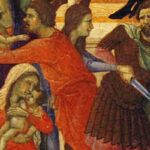Around three years ago I wrote an article analyzing Michel Onfray's essay titled Theory of Dictatorship, in which the author outlined how it is possible to establish a dictatorship in our time, identifying seven stages for its institution: "destroy freedom, impoverish language, abolish truth, suppress history, deny nature, propagate hatred, aspire to Empire." The reactions unleashed following the publication of General Vannacci's book "Il mondo al contrario," most often attributable to bad faith dictated by failure to read the text, brought to my mind the thesis contained in said essay by the French philosopher, but also a passage from the Bible (Numbers 11:25-29) in which the subject of "prophesying" is dealt with, along with an interview given by the then Cardinal Ratzinger, on the subject of who the prophet is and what his function is.
Now, as is well known, the prophet is not one who foretells future events, a kind of fortuneteller, but one who is called to affirm, to reveal truths because he is in contact with God. As the great Cardinal Ratzinger had portrayed, these are truths valid "for today" that naturally, by also illuminating the future, point to the correct path to take. We find this same concept in the passage from the Holy Bible referred to above, from which emerges the figure of two men called by God to "prophesy" even though they were completely unrelated to the institution represented by the Council of Elders. In fact, two people who outside the institutional power of the time are called to proclaim the correct path to redemption, which can be translated secularly as a return to those values and principles, including religious ones, that constituted the fundaments of the West. In this view, the figure of the prophet also takes on the contours of one who challenges uniforming thought, therefore also the political system that that uniforming thought generated or by which it was generated.
Thus correctly understood the figure of the prophet, I was induced to approximate to said biblical figure General Vannacci, as called to "prophesy" precisely in order to confront, in the generalized silence of a too often fearful and homologated politics, the dissipation of every Western value, of every founding element of that culture, impregnated with Christianity, which has formed the entire world, with respect certainly for every minority (numerical) but also with due respect for the deliberately forgotten majority. I understand the trauma suffered by the proponents of the dominant single thought that determines day after day the sunset of the West, in the face of the unexpected return of a forgotten "parrhesia" that brings back values and principles kept concealed from the people by those who claim to oversee civil life, our society, thus apparently forgotten, but ready to be awakened by the honest prophecy of the individual. This is why that ethical racism (Marcello Veneziani, "Dio ci salvi dalla dittatura etica"-January 26, 2012) that dominates our society would like to prevent a common interest from forming around the General's essay, moreover of a politically transversal nature, which would rediscover values that have been dormant due to an anti-historical reading of history and that so-called "woke culture" that now fouls our sentiments and our everyday lives.
And then, welcome a free thought such as the General's that knows how to prophetically awaken the conscience of a people, removing it from a slavery created by an antidemocratic and dictatorial minority, an awakening to which we must hope that politics, too often prone to the dominating thought or, sometimes, even its accomplice, will finally be able to give concrete answers. We therefore welcome General Vannacci, a kind of secular "katechon" called upon to reverse, through the art of "prophesying," an apparently doomed fate.
Lawyer based in Florence, expert in civil corporate law and criminal law and contracts. Graduated in Law at the University of Florence.









Scrivi un commento